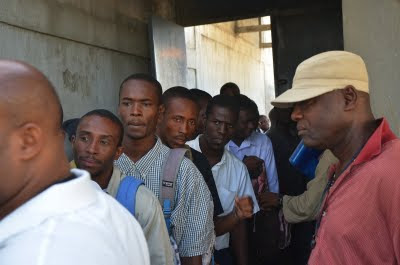
My job on this trip has been helping to coordinate the translators.
First, a little background: the USNS Comfort has been on its humanitarian tour since March. They have brought medical care to Costa Rica, El Salvador, Peru, Ecuador, Jamaica, and Columbia, among others. Haiti is their last stop before returning to Norfolk, Virginia.
At each of the countries the Navy has visited, they have needed translators to work with the doctors and patients. Because the other countries the ship visited are Spanish speaking, they haven't needed as many translators, as many people on the Comfort speak Spanish. In Haiti, they were asking for 100 translators for each day. And by the way, this is a volunteer position; the only pay is a meal and water each day and then at the end, a much-coveted certificate stating that the person did translation work for the U.S. Military. Many of the translators travel up to two hours each way on their own gourdes.
Nonetheless, this did not stop about 150 translators from showing up to work. These translators were referred by various organizations: schools, the US Embassy, churches, and NGOs. My job has been to take down the names of the translators (for the all important certificates, so the translators are very eager to check in with me), ascertain that they are capable of translating, get them their ID badges, help assign them to an area, and troubleshoot for them during the day.
I quizzed them on where they learned English. Quite a few are self taught. Some of the best English-speakers are kids ages 13-18 from a school in Port-au-Prince. They are basically bilingual in English and Creole.
It was a little chaotic the first couple of days, but having too many translators is a much better problem then too few. The translators are assigned to a doctor or a tent. There are tents dedicated to registration, pediatrics, general medical, dental, opthomology, women's health, pharmacy, and discharge planning. Other translators help escort the patients from tent to tent. The system runs a little more smoothly each day.
The clinic is in a hot, shadeless area, so water is very important. The Navy is passing out Meals Ready to Eat, which I'll write more about later.
Pictured above are some translators arriving on the first day of clinic.
No comments:
Post a Comment